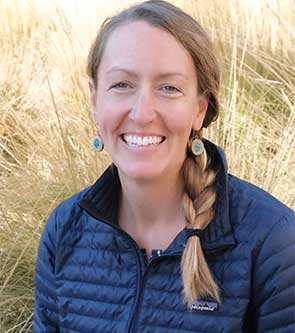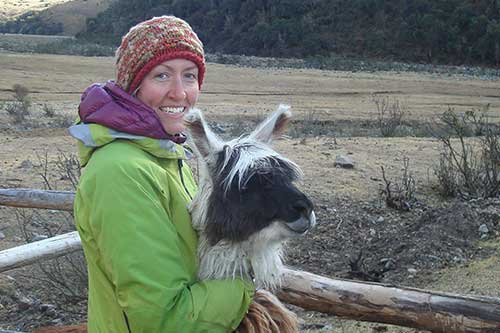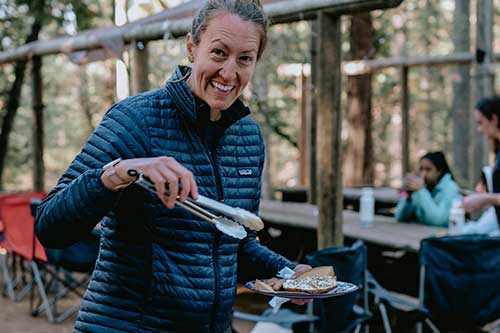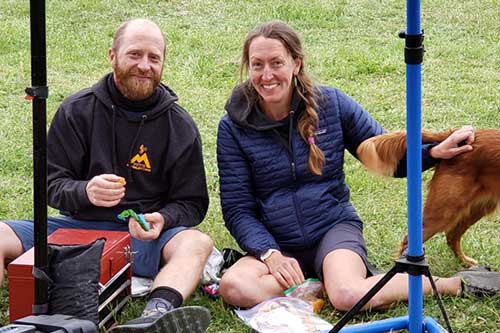Jennie Lane

Jennie Lane, DVM, MPH is still trying to figure out what she’s going to do when she grows up! With experience working in equine ambulatory practice, small animal emergency practice, international livestock development, and now in a position at the One Health Institute at UC Davis, she’s a self described generalist who has a lot of interests in lots of things! Jennie currently leads the Rx One Health Field Institute, which is a One Health field course. In addition to her veterinary and public health knowledge, she draws on experience from being a camp counselor, farm worker, mountain biking coach, avid camper, competitive athlete and backcountry skier to help make the course an interesting, inspiring and safe experience. A love of the outdoors, wild spaces, and keen desire to help our planet be a better place for all living creatures has probably driven most of Jennie’s career decisions in the last ten years. After working in veterinary clinical practice for eight years after graduation, a fellowship in Malawi with Land O’Lakes Venture 37 helped her transition into working in livestock development and One Health research and education.
Full disclosure - at Pat’s encouragement, Jennie and Pat (the two individuals who led this interview series) logged in for a zoom conversation (we did all of the interviews during early COVID days) and did the same questions we asked of all of the other interviewees.
Veterinary School & Year Graduated: Michigan State University, College of Veterinary Medicine, 2007
Additional Degree: MPH, University of California, Berkeley, 2014
Questions and Answers
- Tell me about your most challenging and rewarding veterinary jobs or work experiences.
- One was my position with Land O’ Lakes Venture37 as an animal health technical advisor. I moved to Malawi to work on a goat and poultry project with smallholder farmers. This position was part of a fellowship with the Congressional Hunger Center, which is based in Washington D.C. They pair fellows with different NGOs working on food security, agriculture, and nutrition. I'd always wanted to move to Africa, but it had been really hard to find a position there. When I found this opening, It seemed like a great fit. When I found out I was moving to Malawi, I didn't even know where Malawi was. I had to look on the map to figure that out. I had never been to Africa before and then I moved there for a year.
The position was challenging for many reasons, but mostly stemming from my naivete! From being in a completely new culture, somewhat ambiguous professional expectations, adjusting to a new place to live, making new friends, figuring out how to navigate work politics, learning about international development and all the acronyms and reporting obligations that come with USAID funded programs - there were so many things that were challenging! On top of that, the project I joined was struggling in meeting some key milestones, and there were expectations from the staff on the team that I joined that I’d be able to help magically address some of those challenges. It was tough. At the same time, I also went through a relationship breakup, which was heart wrenching and hard to weather while simultaneously figuring out how to navigate life and work in a new place. It was rewarding because in the end, and especially years later in reflection, I learned SO MUCH, and am a much different (and hopefully more thoughtful and grateful) person than I was before. - What did you love about the position or experience?
- I really liked the team of people that I got to work with during my time in Malawi. It was a very hard position with a very steep learning curve. I learned that I loved working on the team and I enjoyed a good mix of being in the field versus being in the office. I really liked working with farmers and being able to use my experience and training in a way that felt very useful. I was able to apply a wide range of my knowledge in skills in an equally diverse array of tasks. One day I’d be out in the field, teaching livestock extension agents about goat dewormers and how to age a goat by its teeth, the next day I’d be analyzing survey data from a mid-project evaluation, another day I’d be talking to poultry farmers about how their livelihoods, how many eggs their chickens produce, and how many of those eggs are fed to the children in the household (spoiler alert - usually not many). I also loved living in Malawi, making new friends and acquaintances with people from all over the world, and discovering new places, foods, and culture. I’m still in touch with Malawian colleagues and friends I made there and would love to return to live there again sometime.
I also love helping run the RX One Health Field Institute course. It's an experiential One Health field learning course that we hold in the summer - we’ve held it in both East Africa and California. The course brings together graduate students and early career professionals from all around the world to learn about different one health topics while we move to various landscapes and geographies. I love being able to see the participants in the course learn new things and become inspired to be better stewards of the planet in any way that they see possible or find interesting. - Tell me about your journey to get to that point in your life.
- My journey has not been a straight path. When I was first out of vet school, I was an equine clinician and I worked on sport horses and high end competition horses. I started going to South America to do some volunteer work with different veterinary programs that provide veterinary care to working equines. These are horses, donkeys, and mules that work for a living and are essential to families’ livelihoods. I got really curious about the linkages between working equine health and human health and nutrition. I could see how they contribute to families' incomes, but I wanted to learn more about the extent of their roles in helping families. I thought that if we could show the direct impacts of working equine health on human livelihoods, we might be able to get more funding for these important working animals. Curiosity about those connections between animals and humans and a desire to work internationally took me down the path of going back to school to get my Masters in Public Health. While getting my masters, I focused on a project based in Nicaragua, dealing with working equines on mostly coffee and banana farms in the mountains. During my MPH, I also took a lot of courses in maternal and child health and nutrition, specifically around animal source foods and the importance of the different pathways of livestock to nutrition outcomes. Learning more about that took me down the road of wanting to work in livestock development. The field was growing substantially and I wanted to figure out how to get involved.
- As a veterinary student, did you ever imagine yourself taking this journey and having these professional experiences?
- I didn't see myself going this direction because I thought I was going to be double board certified in equine surgery and emergency and critical care. Then the summer after my first year of veterinary school, I spent two months in India on a veterinary study abroad project. That was the first time I'd really traveled abroad. I'd always wanted to travel internationally, but I didn't know how to balance that with a veterinary career. Even after graduation when I was working as an intern and then as an ambulatory veterinarian, I was trying to figure out how to find a job working as a veterinarian internationally. But I didn’t see it all coming together like it has.
- In retrospect, what do you wish you’d known as a veterinary student or early in your career?
- I was really happy with my veterinary school experience. You never know where your path is going to take you. I wish I had known how much I would alienate my classmates by working so hard to try to learn everything. I wish I could have been a little more laid back, but I'm not very good at being laid back. It’s something I’m still working on!
- Would you have changed anything about your time in veterinary school?
- I wish I had gotten more exposure to other parts of Michigan State’s campus that would be relevant to my career. I feel like I got as good of a veterinary education as I could have squeezed out of those four years. I showed up to Michigan State for vet school and immediately got funneled into the vet school stream. I was very unaware of all the other stuff that's on campus. I was in the vet school bubble and within that, very focused on my niche of equine surgery and critical care. It's only now, as an alumna, where I get the broad university emails and I've become exposed to other professional sectors that I recognize that Michigan State is an incredible institution in a lot of other realms as well, with particular strengths in Agricultural Economics and International Agricultural Development. I definitely need and want more skills in both of those topics. I wish that the vet school was able to showcase more of what's going on in other parts of the university to vet students. I will run into Michigan State grads in other countries and they have an enormous and incredible international agricultural development program. I didn't even know that that was part of my university when I was a student there.
- Would you have changed anything about your time since graduating veterinary school?
- There is one job that I probably shouldn't have taken. I learned a lot about practice and bosses, but it was not the right career move for me at that point. The position coincided with the 2008 financial crisis while I was in equine practice and I was pretty desperate for a job. It felt like the right move at the time. If I could go back and do that again, I probably wouldn't take that position. But long term, that job mistake is a small blip on my professional path, it didn’t change or alter where I am now, and I learned from the experience.
- Did you have any mentors or role models along the way that helped or inspired you? Please provide an example of how they helped you or what qualities they had that made them a good mentor? How did you find them?
- I’m very lucky to have had some excellent role models and mentors along the way. Before I was in veterinary school, I worked with a few veterinarians who I still consider some of the best vets I’ve known. They were phenomenal role models who showed me the value of dedication, kind honesty, how to talk to clients, and how to do a physical exam. Another woman, a horse trainer I worked for, demonstrated incredible resilience and what grit looks like to me. In veterinary school, I had an incredible mentor. I still consider her a great role model and I hear her voice in my head when I'm doing surgery and thinking through cases.
When I was trying to make a career shift and when I first transitioned to working in livestock development work, I found it very hard to find mentors that I could connect with and that were modeling the way. They were few and far between. I found one who was doing a lot of research in a space that I thought was really interesting. I'm still sort of intimidated by her and I think of her as a Shero (She-hero). She’s a total superstar in the livestock research realm and I didn't have a personal connection with her until years later. Robyn Alders is another woman who is a role model and inspires me and has helped me. Neither of those relationships were instantaneous. I had to persistently be brave and shut down any insecurities or feelings of embarrassment and just talk to them. When I lived in Malawi, I sought out a mentor at the veterinary lab, and just persistently bugged him with questions in exchange for tea and baked goods. He had a way of always cheering me up, validating whatever new challenging or frustrating experience I’d recently had, and offering me a new way of thinking about a possible solution. I found my mentors through being interested in their work and talking to them. I think that mentors and mentees have a two-way relationship. Mentees can get wisdom and perspective from their mentors and as a mentor, you can get something from your mentee that's useful. I think a good mentor relationship is mutually beneficial for both of you. - Tell me about any pivotal moments or key turning points that shaped your career.
- When I was with Land O’ Lakes, I was part of a year-long livestock and animal source foods nutrition series that I co-organized with the other livestock technical advisor. We organized two in-person conferences, one in Washington DC and one at the International LIvestock Research Institute (ILRI) campus in Nairobi. We also had two webinars that were in collaboration with the International Food Policy Research Institute, ILRI and some other big livestock research programs. Organizing and curating that series gave me a platform to be able to engage with a lot of experts. I learned a lot in terms of event organization, but also how to predict where the development community is going, what people are thinking about, and how to curate content in a way that's useful and relevant. I also learned a lot about networking a lot and pulling people together from different realms that might not necessarily work together, but are working on related topics. Producing that series facilitated a lot of my professional growth.
- Tell me about one or two challenges, setbacks or obstacles that you faced along the way on your professional journey. How did you address those?
- I went into my MPH, which was a very accelerated one-year program and I thought that I was going to graduate and go out and get a job. In reality, it took over a year of very aggressively applying for jobs to finally find a position. It was really frustrating to have it take so long. I had just gotten a new degree and I was trying to pivot my career but I was still doing emergency relief work. I started applying for jobs that weren't asking for veterinarians. I applied for a fellowship, which involved taking a major pay cut. I actually found the fellowship by finding someone with a really cool job. I'd come across her name and some other things that she'd been engaged with. I looked back at her career path and how she'd gotten there and she had been a Leland fellow many years before. That’s how I ended up applying for the position. They weren’t even recruiting veterinarians, but I got the position.
- What was the most important lesson you learned as a veterinarian, and still remember today, and would want to tell vet students about.
- What you learn in veterinary school in terms of how to think in a systems approach, such as taking a good history and doing a physical exam, are analogous skills that can be applied to many other facets of life. It's not necessarily doing a physical exam on an animal, but being able to understand and identify the root causes of problems and come up with a list of differentials and solutions are skills that are applicable to many other parts of life.
- What’s been the biggest highlight of your career so far?
- Watching a bunch of the people learn how to swim on our Rx One Health trip last year was pretty awesome. They learned right off of the beach on Mafia Island where we stay. Seeing them put their faces underwater and snorkel and discover the magic of a coral reef was amazing. What I think that boils down to is helping facilitate opportunities for others to recognize the beauty of the natural world and inspire them to want to figure how to use their skills and talents to help make our world a better place.



